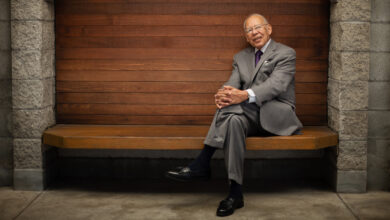How Do LGBTQ+ Students Fare at Christian Colleges? It’s Complicated.

In 2021, the Religious Exception Accountability Project (REAP) brought a lawsuit calling for “an end to the U.S. Department of Education’s complicity in the abuses and unsafe conditions thousands of LGBTQ+ students endure at hundreds of taxpayer-funded, religious colleges and universities.”
The underlying premise of REAP’s suit is that the federal government “is duty-bound by Title IX and the U.S. Constitution to protect sexual and gender minority students at taxpayer-funded colleges and universities”—and this means ending religious exemptions for schools, including many Christian colleges, which order student life according to traditional theologies of sex and gender.
The REAP case, which is ongoing two years later, is not the only reason the experiences of LGBTQ+ students on Christian campuses are closely scrutinized, of course. And neither is REAP the only voice claiming Christian colleges are subjecting thousands—perhaps tens of thousands—of LGBTQ+ students to abuse and its effects, like poor mental health.
Until recently, there have been no studies testing that claim by comparing the mental health of LGBTQ+ students at religious and non-religious universities. While the individual stories of students are necessary, it is equally necessary to have rigorous, empirical studies evaluating the proposition that religious universities are causing harm. Our article, published in the Journal of Affective Disorders (one of the top journals in the field), is the first analysis of this kind.
Using data collected by the Healthy Minds Study, we examined over 135,000 university students from around the nation, around 30,000 of whom self-identified as LGBTQ+. We were able to sort students according to the type of school they attended, as determined by the universities’ self-descriptions as Catholic, evangelical, or an “other Christian” university (including Baptist, Episcopalian, Presbyterian, Nazarene, and Lutheran schools). The data didn’t measure whether schools required students and/or faculty to sign a statement of faith or campus life code; it looked only at their denominational affiliation.
With this information, we were able to compare LGBTQ+ and non-LGBTQ+ students at these religious universities to those at non-religious universities. Part of our purpose was to identify as many nuances as possible. Wheaton College psychologist Mark Yarhouse has noted that LGBTQ+ students on religious campuses are not a monolithic group. They hold “a range of beliefs and values regarding their sexuality and behavior”—some combine a traditional sexual ethic with same-sex attraction, for instance—and their stories resist a simple narrative.
We therefore examined not only whether LGBTQ+ students had better or worse mental health (as measured by reports of suicidal thoughts and anxiety) at one kind of school or the other. We also wanted to see how these students’ engagement with religion and spirituality (as measured by religious activities) might affect their mental health at religious and non-religious colleges.
So what did we find? The answer, unsurprisingly, is complex.
Initially, we hypothesized that student and university “fit” would lead to reports of better mental health. We hypothesized that non-religious students would do better at non-religious universities and that religious students would do better at religious universities. Further, while research has overwhelmingly shown that religion is correlated with better mental health, we hypothesized that LGBTQ+ individuals wouldn’t benefit as much (or perhaps not at all) from being at a religious university.
But our findings didn’t support our hypotheses.
First, we found that religiosity was correlated with better mental health regardless of LGBTQ+ identification.
We also found that students who are less religious, whether LGBTQ+ or not, often reported better mental health while attending a religious university. (Religious students seemed to do just as well at any school.) For instance, students who said religion was unimportant to them typically reported better mental health if they attended a Catholic university than a non-religious university. And those who engaged in no religious extracurricular activities or were not religiously affiliated tended to do better at evangelical schools than non-religious ones.
Remarkably, this pattern held even after we controlled for a host of factors such as the size of the university, whether the university was public or private, the region of the country in which the university was located, the number of extracurricular activities the student was involved in, the student’s relationship status (married, single, divorced, etc.), whether the student was international, the student’s race, and more.
Our study couldn’t determine exactly why students who don’t value religion would experience better health at schools that do. But it’s possible that non-religious students benefit from being in a more religious environment because they’re less likely to encounter or engage in risk-taking behaviors. Ample research has found that religious people are significantly less likely to develop substance use disorders and behavioral disorders such as gambling disorder, compulsive sexual behavior disorder, and gaming disorder.
Two other findings are noteworthy too. One is that LGBTQ+ students reported better mental health at “other Christian” universities compared to non-religious universities. This again was not in line with our initial expectations.
The other is that one group of LGBTQ+ students was at greater risk at evangelical schools, while another group of LGBTQ+ students was at lower risk at those same schools. The difference seemed to be their engagement with religion, a difference we did not see with non-LGBTQ+ students.
For LGBTQ+ students at non-religious universities, the rate of suicidal thoughts varied by approximately 20 percent depending on whether or not the students were religious. For LGBTQ+ students at evangelical universities who participated in religious activities, that rate dropped to just 6 percent. However, for LGBTQ+ students at evangelical universities who did not participate in religious activities, the rate jumped to a staggering 34 percent—about one in three.
This suggests that LGBTQ+ students’ mental health may only benefit from being at an evangelical school if they themselves are religious. LGBTQ+ students who are not engaged in religion may feel doubly disconnected.
What does this mean for religious universities and LGBTQ+ students who attend evangelical schools? One big implication is that we should not see these students as a monolithic group. Some are likely to thrive in evangelical institutions, while others will be at higher risk of suicidal thoughts.
It’s important to recognize that our research can’t determine why some LGBTQ+ students struggle with their mental health at evangelical schools. It could be that these students disengage from religious activities because of how they’re feeling, not the other way around.
Also, students (and their families) select the universities they attend. In many cases, students pick a school they feel fits their needs—and sometimes that may mean a religious school for a non-religious and/or LGBTQ+ student. Our study suggests that even without religious engagement, they may do much better in that environment than they would elsewhere. But the REAP lawsuit could make that choice impossible.
Instead of that maximalist approach, religious universities should examine themselves to determine how to best serve all their students. We’d also like to see further research into this question of how LGBTQ+ students fare at religious schools. Our findings did not support the picture of widespread harm some have painted, but neither could our data answer every question that could be raised.
Justin Dyer is a professor of religious education at Brigham Young University and a fellow at the Wheatley Institute.
Jenet Erickson is an associate professor of religious education at Brigham Young University and a fellow at the Wheatley Institute.




